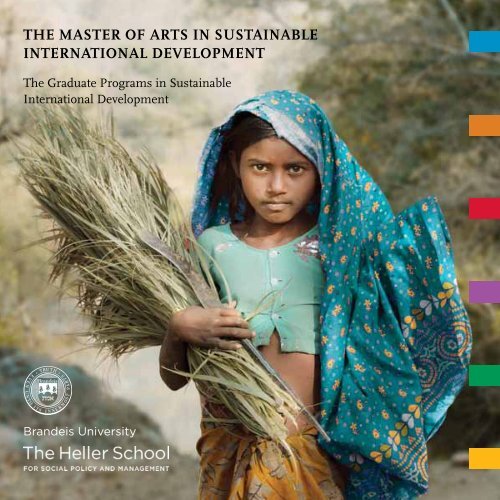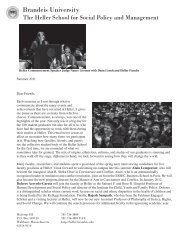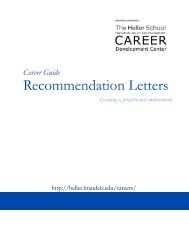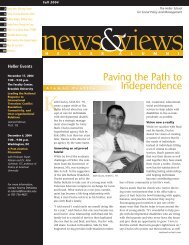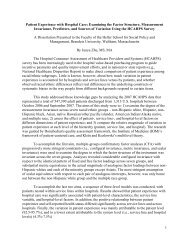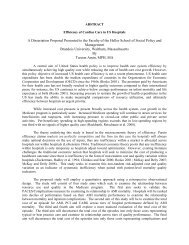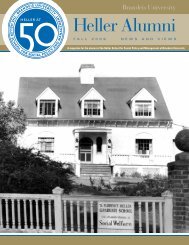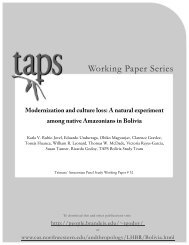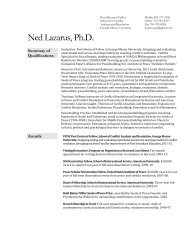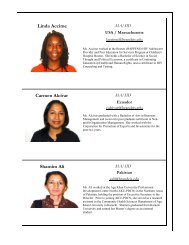Read the new SID brochure - Heller School for Social Policy and ...
Read the new SID brochure - Heller School for Social Policy and ...
Read the new SID brochure - Heller School for Social Policy and ...
Create successful ePaper yourself
Turn your PDF publications into a flip-book with our unique Google optimized e-Paper software.
The Master of Arts in Sustainable<br />
International Development<br />
The Graduate Programs in Sustainable<br />
International Development<br />
Br<strong>and</strong>eis University
“I think that you are here today because<br />
you search <strong>for</strong> a community devoted<br />
to <strong>the</strong> lessening of suffering, because you<br />
see yourself as an agent of change in your<br />
own l<strong>and</strong>, because you have faith in <strong>the</strong><br />
unfolding of a world without poverty <strong>and</strong><br />
preventable disease. You also recognize <strong>the</strong><br />
need <strong>for</strong> rigorous skills to <strong>for</strong>ge enlightened<br />
policies, implement effective programs, <strong>and</strong><br />
nurture <strong>the</strong> dignity <strong>and</strong> full potential of<br />
every child on earth. This is a universal<br />
morality <strong>and</strong> is your calling.”<br />
From his orientation talk<br />
Laurence R. Simon<br />
Professor of International Development<br />
Executive Director, Graduate Programs in Sustainable<br />
International Development<br />
One billion children live in deep<br />
poverty. Six hundred <strong>for</strong>ty million<br />
people lack decent shelter. Four<br />
hundred million lack safe water. Two<br />
hundred seventy million have no<br />
health services. Climate change <strong>and</strong><br />
loss of biodiversity threaten <strong>the</strong> web<br />
of life. Today over 1400 graduates<br />
of our Master of Arts in Sustainable<br />
International Development (<strong>SID</strong>)<br />
program are working throughout <strong>the</strong><br />
world to solve <strong>the</strong>se problems – in<br />
tiny villages, in large urban slums, as<br />
leaders of organizations <strong>and</strong> ministries,<br />
<strong>and</strong> as advocates <strong>for</strong> equitable<br />
global policies on aid <strong>and</strong> trade.
The Pioneer in<br />
Sustainable<br />
International<br />
Development<br />
Begun in 1994, <strong>SID</strong> led <strong>the</strong> way <strong>for</strong> graduate training<br />
on sustainable development. We built a holistic <strong>and</strong><br />
innovative professional curriculum that integrates<br />
development with <strong>the</strong> study of political <strong>and</strong> economic<br />
institutions, <strong>the</strong> allocation of scarce resources, <strong>the</strong><br />
connection of policy <strong>and</strong> practice with ecology, demography,<br />
human rights <strong>and</strong> capabilities – <strong>and</strong> that draws<br />
upon intellectual <strong>and</strong> cultural histories of justice <strong>and</strong><br />
social change. We equip our students with practical<br />
skills in project <strong>and</strong> program planning <strong>and</strong> implementation,<br />
monitoring <strong>and</strong> evaluation, <strong>and</strong> organizational<br />
management. The second year of our degree program<br />
applies that learning to real world problems through<br />
field practicums within host development organizations<br />
throughout <strong>the</strong> world. An option <strong>for</strong> second year<br />
advanced study fur<strong>the</strong>rs learning through facultydirected<br />
independent study. An accelerated 1 year<br />
degree is available <strong>for</strong> advanced professionals.
“The poor person does not exist as an<br />
inescapable fact of destiny. His or her<br />
existence is not politically neutral,<br />
<strong>and</strong> it is not ethically innocent….<br />
Hence <strong>the</strong> poverty of <strong>the</strong> poor is not a<br />
call to generous relief action, but a<br />
dem<strong>and</strong> that we go <strong>and</strong> build a<br />
different social order.”<br />
Dr. Gustavo Gutierrez, O.P.<br />
A Distinct <strong>and</strong> Diverse<br />
Community of Practice<br />
<strong>SID</strong> is among <strong>the</strong> world’s largest <strong>and</strong><br />
most diverse development graduate<br />
training programs with over 140 students<br />
in residence <strong>and</strong> many o<strong>the</strong>rs<br />
in field practicums. Each year approximately<br />
two thirds of our students come<br />
from developing nations, typically<br />
representing more than 60 countries<br />
<strong>and</strong> speaking over 100 languages - it is<br />
truly a global community embracing<br />
<strong>and</strong> celebrating <strong>the</strong> world’s cultures <strong>and</strong><br />
religions <strong>and</strong> learning from each o<strong>the</strong>r.<br />
A Seasoned <strong>and</strong><br />
Accessible Faculty<br />
Our faculty includes renowned scholars<br />
<strong>and</strong> seasoned international development<br />
professionals. They are committed to<br />
working closely with students on <strong>and</strong><br />
off campus <strong>and</strong> continue <strong>the</strong>ir deep<br />
involvement in cutting-edge research<br />
<strong>and</strong> program planning. Many have held<br />
key positions in such organizations as<br />
UNDP, UNICEF, UNFPA, UNIFEM,<br />
USAID, <strong>the</strong> Oxfams, <strong>the</strong> Ford Foundation,<br />
InterAction, World Education, John<br />
Snow Inc., Abt Associates, <strong>and</strong> <strong>the</strong> Aga<br />
Khan Development Network.<br />
Partnering with Leading<br />
Institutions to Educate<br />
Tomorrow’s Leaders<br />
<strong>SID</strong> has achieved an exceptional reputation<br />
with competitive scholarship programs<br />
including <strong>the</strong> Joint Japan/World<br />
Bank Graduate Scholarship Program,<br />
Ford Foundation’s International Fellowship<br />
Program, Soros Foundation/Open<br />
Society Institute, Fulbright, AMIDEAST<br />
<strong>and</strong> Rotary International. We have a long<br />
history of working with international<br />
sponsors to bring talented young <strong>and</strong><br />
mid-career professionals to <strong>SID</strong>.<br />
An Innovative <strong>and</strong><br />
Pioneering Curriculum<br />
<strong>SID</strong> is recognized globally as a leader in<br />
<strong>the</strong> training of development practitioners<br />
<strong>and</strong> policy makers. Our interdisciplinary<br />
curriculum is based on real world problems<br />
<strong>and</strong> experience <strong>and</strong> incorporates<br />
into courses current research on <strong>the</strong> underlying<br />
causes of poverty, environmental<br />
degradation, preventable disease <strong>and</strong><br />
o<strong>the</strong>r challenges. Our curriculum encourages<br />
students to think about global<br />
problems, <strong>and</strong> <strong>the</strong> roles that institutions<br />
as well as village <strong>and</strong> urban communities<br />
can play in finding solutions.
Laying <strong>the</strong> Foundations of<br />
A World<br />
Without Poverty<br />
<strong>SID</strong>’s curriculum recognizes that <strong>the</strong> world of development<br />
is changing rapidly with <strong>new</strong> models of development<br />
emerging in <strong>the</strong> global south <strong>and</strong> a redistribution<br />
of wealth. This is <strong>the</strong> most exciting time to train <strong>for</strong> a<br />
career in development <strong>for</strong> <strong>the</strong> potential has never been<br />
greater <strong>for</strong> a triumph over poverty <strong>and</strong> inequality. Yet<br />
enormous challenges exist if that <strong>new</strong> world is to be<br />
humane, equitable <strong>and</strong> sustainable. The challenges are<br />
not just about growth, but about human happiness <strong>and</strong><br />
dignity. There are challenges of social trans<strong>for</strong>mation<br />
<strong>and</strong> of harnessing <strong>the</strong> power of knowledge to advance<br />
social, economic, <strong>and</strong> environmental rights.<br />
SEE:<br />
http://heller.br<strong>and</strong>eis.edu/<strong>SID</strong><br />
<strong>for</strong> more details.
Development Ethics<br />
<strong>SID</strong> is <strong>the</strong> first development graduate<br />
training program in <strong>the</strong> world to present<br />
its curriculum in a global liberal arts <strong>and</strong><br />
human development framework. Ideas<br />
have histories <strong>and</strong> cultures <strong>and</strong> are considered<br />
at <strong>SID</strong> <strong>for</strong> <strong>the</strong>ir potential to help<br />
solve development problems. Our goal is<br />
to broaden <strong>and</strong> deepen critical thinking<br />
skills <strong>and</strong> to assist students to consider<br />
<strong>the</strong> ethical dimensions of development<br />
<strong>the</strong>ory <strong>and</strong> practice <strong>and</strong> how ethics influence<br />
<strong>the</strong>ir own work.<br />
The Year-in-Residence<br />
• Core courses that build a knowledge<br />
<strong>and</strong> skills foundation within an<br />
integrative <strong>and</strong> interdisciplinary<br />
environment<br />
• Numerous electives that offer a choice<br />
of interests both at <strong>SID</strong> as well as<br />
throughout Br<strong>and</strong>eis <strong>and</strong> at o<strong>the</strong>r<br />
Boston-area universities<br />
• Course offerings that foster breadth<br />
<strong>and</strong> depth at a master’s level in development<br />
<strong>the</strong>ory, planning, management<br />
<strong>and</strong> policy influence; a year that<br />
encourages students’ self-reflection on<br />
<strong>the</strong> purpose <strong>and</strong> impact of <strong>the</strong>ir professional<br />
lives in development<br />
• A multicultural <strong>and</strong> multinational<br />
environment that transcends divisions<br />
of nation, religion, race, ethnicity,<br />
class, gender, caste, or o<strong>the</strong>r particular<br />
identities<br />
The Second-Year: A Live<br />
Case Study or Advanced<br />
Academic Training<br />
• A six to nine month practicum within<br />
a recognized development organization<br />
that nurtures <strong>new</strong> ideas, deepens<br />
field experience <strong>and</strong> professional<br />
growth <strong>and</strong> is suited to a student’s<br />
background, level of experience <strong>and</strong><br />
career path<br />
• A practicum that is focused on a<br />
development issue or problem <strong>and</strong><br />
that yields a Master’s Paper in <strong>the</strong><br />
<strong>for</strong>m of a case study<br />
• Hundreds of practicum organizations<br />
have included major global institutions<br />
such as <strong>the</strong> UN Development<br />
Programme, <strong>the</strong> FAO <strong>and</strong> <strong>the</strong> World<br />
Bank; international NGOs such as<br />
Oxfam, Catholic Relief Services <strong>and</strong><br />
<strong>the</strong> Aga Khan Foundation; human<br />
rights <strong>and</strong> policy advocacy organizations;<br />
<strong>and</strong> national <strong>and</strong> local governments<br />
<strong>and</strong> NGOs throughout <strong>the</strong><br />
developing world.<br />
• The second-year practicum makes <strong>the</strong><br />
Master’s Degree program af<strong>for</strong>dable as<br />
<strong>the</strong>re is no course tuition during <strong>the</strong><br />
off-campus year<br />
• The second year advanced study<br />
option includes coursework <strong>and</strong><br />
independent study at <strong>SID</strong> under <strong>the</strong><br />
mentorship of a senior professor<br />
• The second year culminates in a<br />
program-wide Capstone Conference<br />
at which students present <strong>the</strong>ir case<br />
studies on professional panels
Dual <strong>and</strong> Joint Degree Options<br />
• The MA/<strong>SID</strong> <strong>and</strong> <strong>the</strong> Master of Business<br />
Administration dual degree is a five semester<br />
program that streng<strong>the</strong>ns strategic organizational<br />
<strong>and</strong> financial skills in <strong>the</strong> context of global <strong>and</strong><br />
national development.<br />
• The MA/<strong>SID</strong> <strong>and</strong> <strong>the</strong> Master of Arts in Coexistence<br />
<strong>and</strong> Conflict dual degree is a unique<br />
program that gives students <strong>the</strong> opportunity to<br />
train with expert faculty <strong>and</strong> practitioners in <strong>the</strong><br />
fields of development <strong>and</strong> conflict resolution.<br />
• The MA/<strong>SID</strong> <strong>and</strong> Women’s <strong>and</strong> Gender Studies<br />
joint degree offers students additional tools<br />
needed <strong>for</strong> incorporating interdisciplinary<br />
women’s <strong>and</strong> gender studies, knowledge <strong>and</strong><br />
methodologies into <strong>the</strong>ir learning <strong>and</strong> research.<br />
• The MA/<strong>SID</strong> <strong>and</strong> Juris Doctorate with Nor<strong>the</strong>astern<br />
University <strong>School</strong> of Law dual degree<br />
is an accelerated four-year program that provides<br />
law students with exposure to issues of globalization<br />
<strong>and</strong> international development policy <strong>and</strong><br />
practice.<br />
In addition, <strong>the</strong> Graduate Programs in<br />
Sustainable International Development<br />
include:<br />
• The M.S. in International Health <strong>Policy</strong><br />
<strong>and</strong> Management<br />
The MS/IHPM degree program trains<br />
students in state-of-<strong>the</strong> art approaches<br />
<strong>and</strong> techniques to develop sound health<br />
policies, evaluate health programs<br />
<strong>and</strong> to manage implementation. The<br />
program addresses <strong>the</strong> critical gap that<br />
often exists between <strong>the</strong> planning <strong>and</strong><br />
implementation of health programs.<br />
And are affiliated with:<br />
• Doctoral Studies in Global Health<br />
<strong>and</strong> Development<br />
The Doctor of Philosophy in <strong>Social</strong><br />
<strong>Policy</strong> with a Global Health <strong>and</strong> Development<br />
<strong>Policy</strong> concentration prepares<br />
graduates <strong>for</strong> challenging careers<br />
developing <strong>and</strong> implementing research<br />
<strong>and</strong> policy that address <strong>the</strong> problems<br />
of poverty <strong>and</strong> ill health throughout <strong>the</strong><br />
developing world.<br />
“Massive poverty <strong>and</strong> obscene<br />
inequality are such terrible<br />
scourges of our times – times<br />
in which <strong>the</strong> world boasts<br />
breathtaking advances in science,<br />
technology, industry <strong>and</strong> wealth<br />
accumulation – that <strong>the</strong>y have<br />
to rank alongside slavery <strong>and</strong><br />
apar<strong>the</strong>id as social evils.”<br />
Nelson M<strong>and</strong>ela
Meet A Few of Our<br />
Faculty<br />
Laurence R. Simon, Ph.D.<br />
Professor <strong>and</strong> Director, MA/<strong>SID</strong><br />
Dr. Simon began his career in Latin America <strong>and</strong> served<br />
as Oxfam America’s director of global policy analysis. He<br />
was <strong>the</strong> Founding President of <strong>the</strong> American Jewish World<br />
Service <strong>and</strong> founded GrainPro, Inc. that developed <strong>the</strong> first<br />
practical grain storage technologies <strong>for</strong> relief <strong>and</strong> development<br />
that met <strong>the</strong> terms of <strong>the</strong> Montreal Protocol. He<br />
later worked on poverty alleviation in Asia <strong>for</strong> <strong>the</strong> United<br />
Nations Development Programme <strong>and</strong> <strong>the</strong> World Bank<br />
<strong>and</strong> throughout his career has worked on disaster relief<br />
<strong>and</strong> rehabilitation in Sou<strong>the</strong>rn <strong>and</strong> Eastern Africa, Latin<br />
America, <strong>and</strong> Bosnia. Dr. Simon served as Senior Adviser<br />
on Global Poverty at <strong>the</strong> Google Foundation. He teaches<br />
<strong>the</strong>ories of development, l<strong>and</strong> poverty <strong>and</strong> re<strong>for</strong>m, NGOs<br />
<strong>and</strong> civil society, <strong>and</strong> an annual seminar on Paulo Freire.<br />
SEE:<br />
http://heller.br<strong>and</strong>eis.edu/facultyguide<br />
<strong>for</strong> bios on over 100 <strong>Heller</strong> <strong>and</strong> affiliated faculty
Susan Holcombe, Ph.D.<br />
Professor of <strong>the</strong> Practice <strong>and</strong><br />
Director, Learning Across Borders<br />
Dr. Holcombe’s teaching <strong>and</strong> publications<br />
highlight a distinguished career<br />
of practice <strong>and</strong> a focus on building<br />
capabilities <strong>for</strong> human development.<br />
She was Global Program Director <strong>for</strong><br />
Oxfam America <strong>and</strong> has served in<br />
various positions with UNFPA,<br />
UNIFEM <strong>and</strong> UNICEF in field<br />
postings in Asia, Africa <strong>and</strong> Latin<br />
America. Dr. Holcombe currently<br />
directs <strong>SID</strong>’s Learning Across Borders<br />
inter-university courses on Aligning<br />
Development <strong>Policy</strong> <strong>and</strong> Practice, <strong>and</strong><br />
teaches demography <strong>and</strong> <strong>the</strong>ories of<br />
change. She is <strong>the</strong> <strong>SID</strong> team leader <strong>for</strong><br />
collaborations in China <strong>and</strong> Ghana.<br />
Joseph Assan, Ph.D.<br />
Assistant Professor<br />
Dr. Assan is an African development<br />
specialist from Ghana. He has<br />
extensive field research experience<br />
in international development with<br />
particular interest in <strong>the</strong> political<br />
economy of sustainable development.<br />
He was <strong>the</strong> director of <strong>the</strong><br />
Global Master’s in Development<br />
Practice program at Trinity College<br />
Dublin. His recent research examines<br />
<strong>the</strong> interaction between sustainable<br />
livelihoods, environmental<br />
variability <strong>and</strong> human security within<br />
<strong>the</strong> context of poverty reduction.<br />
Lisa Lynch, Ph.D.<br />
Dean<br />
Dean Lynch is Maurice B. Hexter<br />
Professor of <strong>Social</strong> <strong>and</strong> Economic<br />
<strong>Policy</strong>. She is <strong>the</strong> <strong>for</strong>mer Chief<br />
Economist <strong>for</strong> <strong>the</strong> U.S. Department<br />
of Labor, chair of <strong>the</strong> board of<br />
Directors <strong>for</strong> <strong>the</strong> Federal Reserve<br />
Bank of Boston <strong>and</strong> president-elect<br />
of <strong>the</strong> Labor <strong>and</strong> Employment<br />
Relations Association. Her research<br />
examines investments in education<br />
<strong>and</strong> training, youth unemployment,<br />
<strong>and</strong> <strong>the</strong> impact of technological<br />
<strong>and</strong> organizational innovation. She<br />
teaches “Poverty, Inequalities <strong>and</strong><br />
Development.”<br />
Ricardo Godoy, Ph.D.<br />
Professor<br />
Dr. Godoy is a cultural anthropologist<br />
who draws on insights from<br />
evolutionary biology <strong>and</strong> economic<br />
<strong>the</strong>ory to <strong>for</strong>mulate hypo<strong>the</strong>ses<br />
about <strong>the</strong> effects of market exposure,<br />
globalization, or modernization on<br />
<strong>the</strong> well-being <strong>and</strong> <strong>the</strong> use of natural<br />
resources of indigenous people. Dr.<br />
Godoy manages <strong>the</strong> Tsimane’ Amazonian<br />
Panel Study that measures<br />
annually socioeconomic, demographic,<br />
health, <strong>and</strong> psychological<br />
indicators. He teaches household<br />
economics, survey design <strong>and</strong> data<br />
analysis, natural resource planning,<br />
<strong>and</strong> measures of inequality.
Marion Howard, M.A. ’04<br />
Associate Professor of <strong>the</strong> Practice<br />
<strong>and</strong> Associate Director<br />
Ms. Howard lived in <strong>the</strong> San Andres<br />
Archipelago, Western Caribbean <strong>for</strong><br />
over 25 years <strong>and</strong> serves as environmental<br />
adviser to Colombia’s sustainable<br />
development agency <strong>for</strong> <strong>the</strong> archipelago,<br />
CORALINA. Ms. Howard<br />
coordinated <strong>the</strong> development of <strong>the</strong><br />
country’s first marine protected area,<br />
<strong>the</strong> Seaflower, which was awarded<br />
<strong>the</strong> top conservation prize by <strong>the</strong><br />
Convention on Biological Diversity.<br />
Ms. Howard teaches planning <strong>and</strong><br />
implementation, as well as integrated<br />
conservation <strong>and</strong> development <strong>and</strong><br />
environmental treaties.<br />
Anita F. Hill, J.D.<br />
Professor<br />
Dr. Hill teaches courses on law <strong>and</strong><br />
society, gender equality, race <strong>and</strong><br />
class, legal history <strong>and</strong> social justice.<br />
She is <strong>the</strong> author of numerous<br />
articles on international commercial<br />
law <strong>and</strong> civil rights. Her book,<br />
Reimagining Equality: Stories of<br />
Gender, Race <strong>and</strong> Finding Home<br />
explores <strong>the</strong> roots of belonging in<br />
<strong>the</strong> aftermath of <strong>the</strong> housing crisis in<br />
America. Dr. Hill’s memoir, Speaking<br />
Truth to Power, chronicles her experience<br />
as a witness in <strong>the</strong> confirmation<br />
hearing <strong>for</strong> Supreme Court Justice<br />
Clarence Thomas.<br />
Eric Olson, Ph.D.<br />
Senior Lecturer<br />
Dr. Olson’s research focuses on <strong>the</strong><br />
ecological consequences of invasive<br />
species, <strong>and</strong> <strong>the</strong> policy framework<br />
to protect <strong>and</strong> restore wild habitats.<br />
He is a specialist on tropical <strong>for</strong>est<br />
food webs <strong>and</strong> has 15 years of field<br />
research in <strong>the</strong> <strong>for</strong>ests of Costa Rica.<br />
Dr. Olson teaches courses on climate<br />
change <strong>and</strong> adaptation, major ecological<br />
threats, water, ecology of health,<br />
environmental impact assessment<br />
<strong>and</strong> ecotourism.<br />
Ravi Lakshmikanthan,<br />
M.A. ’99<br />
Lecturer <strong>and</strong> Assistant Dean<br />
Mr. Lakshmikanthan is a specialist<br />
in Geographic In<strong>for</strong>mation Systems<br />
(GIS) <strong>and</strong> teaches introductory <strong>and</strong><br />
applied GIS. He has worked on<br />
water <strong>and</strong> sanitation projects in India<br />
<strong>for</strong> <strong>the</strong> World Bank <strong>and</strong> at United<br />
Nations headquarters in New York<br />
<strong>and</strong> has been a consultant to Pathfinder<br />
International <strong>for</strong> a GIS project<br />
in Bangladesh. Mr. Lakshmikanthan<br />
is <strong>the</strong> <strong>SID</strong> team leader <strong>for</strong> collaborations<br />
in India.
Phillip Martin, M.A.<br />
Adjunct Lecturer<br />
Cristina Espinosa, Ph.D.<br />
Assistant Professor<br />
Rajesh Sampath, Ph.D.<br />
Assistant Professor<br />
Jeffrey Ashe, M.A.<br />
Adjunct Professor<br />
As <strong>the</strong> founder <strong>and</strong> executive<br />
producer of Lifted Veils Productions,<br />
Mr. Martin has pioneered ef<strong>for</strong>ts<br />
to bring race relations programs to<br />
mainstream radio <strong>and</strong> is a frequent<br />
reporter on global issues <strong>for</strong> both<br />
National Public Radio <strong>and</strong> <strong>the</strong> BBC.<br />
Previously he spent 4 years with<br />
Oxfam America as <strong>the</strong> National<br />
Projects Director. He is currently<br />
spearheading The Color Initiative,<br />
an ongoing BBC/WGBH radiojournalism<br />
project funded by <strong>the</strong><br />
Ford Foundation, <strong>the</strong> Massachusetts<br />
Foundation <strong>for</strong> <strong>the</strong> Humanities <strong>and</strong><br />
<strong>the</strong> Funding Exchange (Paul Robeson<br />
Fund). Mr. Martin teaches effective<br />
communications <strong>for</strong> impact.<br />
Dr. Espinosa worked <strong>for</strong> 25 years<br />
as a researcher <strong>and</strong> program manager<br />
in sustainable development<br />
with diverse social groups in Peru.<br />
She focused on <strong>the</strong> links between<br />
gender <strong>and</strong> livelihoods <strong>and</strong> changing<br />
macroeconomic contexts <strong>and</strong><br />
has researched <strong>the</strong> role of culture<br />
<strong>and</strong> ethnicity in social hierarchies.<br />
Dr. Espinosa headed <strong>the</strong> Global<br />
<strong>Social</strong> <strong>Policy</strong> Program <strong>for</strong> IUCN, <strong>the</strong><br />
international conservation organization.<br />
Her courses link gender with<br />
<strong>the</strong> environment, globalization <strong>and</strong><br />
education, <strong>and</strong> indigenous peoples<br />
<strong>and</strong> development.<br />
Dr. Sampath is a philosopher <strong>and</strong><br />
ethicist building <strong>SID</strong>’s Development<br />
Ethics Initiative. His research interests<br />
are in twentieth century Anglo-<br />
American <strong>and</strong> European philosophy<br />
with comparative studies to African,<br />
Asian <strong>and</strong> Latin American traditions,<br />
<strong>the</strong>ories of modernization <strong>and</strong> social<br />
change, <strong>the</strong> sociology of knowledge<br />
<strong>and</strong> <strong>the</strong>ir intersections with topics<br />
in comparative religious studies. Dr.<br />
Sampath teaches ethics, rights <strong>and</strong><br />
development, <strong>the</strong>ories of justice,<br />
religion <strong>and</strong> development, <strong>and</strong> social<br />
<strong>the</strong>ory of Amartya Sen <strong>and</strong> <strong>the</strong> human<br />
capabilities approach.<br />
Mr. Ashe directs <strong>the</strong> Community<br />
Finance Program at Oxfam America<br />
<strong>and</strong> oversees <strong>the</strong> Saving <strong>for</strong> Change<br />
initiative in Mali, Senegal <strong>and</strong> Cambodia.<br />
He was founder of Working<br />
Capital, once <strong>the</strong> largest micro-enterprise<br />
program in <strong>the</strong> US. Mr. Ashe<br />
also designed, assisted <strong>and</strong> evaluated<br />
micro-enterprise programs in 25<br />
countries throughout Asia, Africa,<br />
Latin America <strong>and</strong> Eastern Europe<br />
<strong>for</strong> <strong>the</strong> World Bank, USAID <strong>and</strong><br />
many NGO clients. Mr. Ashe teaches<br />
micro-finance <strong>and</strong> entrepreneurship.
A.K. N<strong>and</strong>akumar, Ph.D.<br />
Professor of <strong>the</strong> Practice, Director,<br />
MS/IHPM <strong>and</strong> Director, Institute <strong>for</strong><br />
Global Health <strong>and</strong> Development<br />
Dr. N<strong>and</strong>akumar served as a Senior<br />
Program Officer in Global Health<br />
Delivery at <strong>the</strong> Bill <strong>and</strong> Melinda<br />
Gates Foundation. Prior to coming to<br />
<strong>the</strong> United States, he worked <strong>for</strong> <strong>the</strong><br />
Indian Administrative Service where<br />
he held senior positions in government.<br />
Dr. N<strong>and</strong>akumar has over 20<br />
years of technical <strong>and</strong> managerial<br />
experience in health care financing<br />
in <strong>the</strong> U.S. <strong>and</strong> developing countries<br />
with a specific focus on long-term<br />
care financing, national health accounts,<br />
<strong>and</strong> <strong>the</strong> impact of aging on<br />
health systems.<br />
Wu Zeng, M.D., Ph.D. ’09<br />
Scientist, Lecturer <strong>and</strong> Assistant<br />
Director, MS/IHPM<br />
Dr. Zeng’s research focuses on health<br />
financing, HIV/AIDS financing, cost<br />
<strong>and</strong> cost-effectiveness analysis of<br />
health interventions, <strong>and</strong> program<br />
evaluation in both developed <strong>and</strong><br />
developing countries. Dr. Zeng has<br />
worked extensively with UNAIDS<br />
to evaluate <strong>the</strong> efficiency of national<br />
HIV/AIDS programs <strong>and</strong> has conducted<br />
research in China, <strong>the</strong> Gambia,<br />
Haiti, Rw<strong>and</strong>a, Singapore, <strong>and</strong> <strong>the</strong><br />
United States.<br />
Donald Shepard, Ph.D.<br />
Professor<br />
Dr. Shepard is an internationally<br />
respected health economist concerned<br />
with maintaining <strong>and</strong> improving health<br />
in <strong>the</strong> United States <strong>and</strong> developing<br />
countries. His current research interests<br />
include cost <strong>and</strong> cost-effectiveness<br />
analysis in health <strong>and</strong> health financing,<br />
especially concerning dengue, HIV/<br />
AIDS, cardiovascular disease, vaccines<br />
<strong>and</strong> environmental measures to control<br />
disease. He teaches cost-effectiveness<br />
analysis.<br />
Clark Abt, Ph.D.<br />
Adjunct Professor<br />
Dr. Abt is an engineer, educator,<br />
environmentalist, entrepreneur,<br />
<strong>and</strong> social scientist. Trained as an<br />
industrial engineer at MIT, he<br />
completed seven years at Ray<strong>the</strong>on’s<br />
Space Systems Division as Manager<br />
of its Strategic Studies Department.<br />
He founded an interdisciplinary<br />
socio-economic policy research<br />
company, Abt Associates Inc., which<br />
he grew into one of <strong>the</strong> leading<br />
international research firms. Dr.<br />
Abt teaches courses on re<strong>new</strong>able<br />
energy <strong>and</strong> its cost-effectiveness, <strong>and</strong><br />
seminars on social experiments <strong>and</strong><br />
disaster management.
Meet A Few of Our<br />
Students<br />
Aloysius Toe<br />
Liberia, MA/<strong>SID</strong> <strong>and</strong> COEX Dual Degree<br />
Aloysius Toe is one of Liberia’s leading human rights<br />
activists. During Liberia’s civil war, Mr. Toe led <strong>the</strong><br />
Movement <strong>for</strong> <strong>the</strong> Defense of Human Rights. Mr. Toe<br />
started over 100 human rights clubs, called attention<br />
to abuses <strong>and</strong> promoted human rights education in<br />
Liberian schools. In 2001, he led non-violent protests<br />
against <strong>the</strong> politically-motivated murders of Liberian<br />
activists. Mr. Toe has worked in various capacities <strong>and</strong><br />
managed several projects <strong>for</strong> Oxfam Great Britain, Concern<br />
Worldwide <strong>and</strong> o<strong>the</strong>r organizations. He holds a<br />
B.A. in Political Science from <strong>the</strong> University of Liberia.<br />
Mr. Toe is founder <strong>and</strong> Executive Director of <strong>the</strong> Foundation<br />
<strong>for</strong> Human Rights <strong>and</strong> Democracy in Liberia.<br />
SEE:<br />
http://heller.br<strong>and</strong>eis.edu/alumni/profiles.html<br />
<strong>for</strong> some of our 1400 graduates.
Jarnail Singh<br />
Feldman Fellow, India, MA/<strong>SID</strong><br />
Born <strong>and</strong> brought up in a small town of<br />
Bihar, India, Mr. Singh holds a Master’s<br />
in Environmental Studies from TERI<br />
University, New Delhi. He has managed<br />
solar energy projects across India<br />
<strong>for</strong> three years under TERI’s Lighting<br />
a Billion Lives campaign. His expertise<br />
lies in linking biodiversity conservation<br />
with energy access within un-electrified<br />
villages around protected areas of India.<br />
His expectation from <strong>the</strong> <strong>Heller</strong> <strong>SID</strong><br />
program is to develop critical thinking<br />
skills to analyze <strong>and</strong> ensure that <strong>the</strong><br />
policies in <strong>the</strong> industrialized <strong>and</strong> developing<br />
countries actually lead<br />
to sustainable development.<br />
Azizou Atte-oudeyi<br />
Thomas R. Pickering Graduate<br />
Foreign Affairs Fellow, Togo/USA,<br />
MA/<strong>SID</strong><br />
Azizou Atte-oudeyi is founder <strong>and</strong><br />
secretary general of Ligue des Jeunes<br />
pour la Promotion de la Paix, an<br />
organization in Togo with a mission<br />
to educate youth in non-violent<br />
protest. He has had a deep engagement<br />
in social <strong>and</strong> humanitarian<br />
activities since his youth <strong>and</strong> at<br />
<strong>the</strong> Universitie de Lome where he<br />
earned his Bachelors in English.<br />
Ola Haddad<br />
AMIDEAST Fulbright Scholar,<br />
Palestine, MA/<strong>SID</strong><br />
Ola Haddad has worked <strong>for</strong> <strong>the</strong><br />
United Nations Relief <strong>and</strong> Works<br />
Agency <strong>for</strong> Palestinian Refugees in<br />
Gaza since 2006. She has served as<br />
<strong>the</strong> community development officer<br />
(youth <strong>and</strong> children) <strong>for</strong> <strong>the</strong> relief <strong>and</strong><br />
social services department as well as a<br />
training coordinator <strong>for</strong> community<br />
mental health programs. Ms. Haddad<br />
has an MBA from Islamic University<br />
of Gaza <strong>and</strong> a Bachelors in economics<br />
with a minor in accounting.<br />
Jin Hu<br />
China, MA/<strong>SID</strong><br />
Jin Hu has extensive experience<br />
containing <strong>the</strong> spread of HIV/AIDS<br />
in China. She was <strong>the</strong> HIV/AIDS<br />
Program Officer with Oxfam Hong<br />
Kong prior to joining <strong>the</strong> <strong>SID</strong> Program.<br />
Earlier she was on <strong>the</strong> staff of<br />
Save <strong>the</strong> Children U.K. as HIV Prevention<br />
Project officer in <strong>the</strong> China<br />
Program. She has a Bachelors degree<br />
from Yunnan University’s<br />
Foreign Language College.
Sustainable International Development<br />
Research <strong>and</strong><br />
Practice<br />
We are bringing <strong>the</strong> best research in global development<br />
<strong>and</strong> health to leaders <strong>and</strong> policymakers in<br />
government <strong>and</strong> civil society to build equity <strong>for</strong> <strong>the</strong><br />
poor <strong>and</strong> advance social justice.<br />
A Faculty Engaged in Critical Research<br />
Renowned experts in <strong>the</strong>ir fields, our faculty are<br />
engaged in applied research on urgent issues of<br />
poverty, health <strong>and</strong> environmental stress faced by<br />
low <strong>and</strong> middle income countries. Here are a few<br />
examples of our work.<br />
Left: <strong>SID</strong> graduate Monisha Mukherjee ’09 of India works in poor rural<br />
villages. Photo coutesy of Ford Foundation International Fellowships<br />
Program, India. Photo by Vidura J. Bahadu.
Estimating The Costs of<br />
Mosquito-Born Disease<br />
Dengue poses a deadly health threat <strong>for</strong><br />
millions of people <strong>and</strong> carries a heavy<br />
economic cost. Donald Shepard is<br />
leading a series of studies assessing <strong>the</strong><br />
total burden imposed by dengue, a viral<br />
febrile illness transmitted by mosquitoes.<br />
Shepard <strong>and</strong> colleagues published<br />
<strong>the</strong> first cost-effectiveness study of a<br />
potential dengue vaccine in 2004 <strong>and</strong><br />
recently led an eight-country study of<br />
dengue’s impact. A recent special issue<br />
of <strong>the</strong> World Health Organization’s<br />
Dengue Bulletin included seven papers<br />
with <strong>Heller</strong> co-authors.<br />
Scaling-Up Innovative<br />
Models in Agriculture<br />
<strong>and</strong> Rural Development<br />
At <strong>the</strong> request of <strong>the</strong> World Bank, Susan<br />
Holcombe led a study of 22 agriculture<br />
<strong>and</strong> rural development projects funded<br />
by <strong>the</strong> Development Marketplace to<br />
determine which have <strong>the</strong> most potential<br />
to be scaled up. The first stage involved<br />
an extensive literature review <strong>and</strong> an<br />
initial appraisal of each project. Next,<br />
Holcombe led a team of faculty <strong>and</strong><br />
graduate students in developing <strong>and</strong><br />
applying an analytic framework <strong>for</strong><br />
assessing <strong>the</strong> scalability of innovative<br />
projects in India, Mongolia <strong>and</strong> Nigeria.<br />
These field studies yielded recommendations<br />
that were submitted in a major<br />
report to <strong>the</strong> Agriculture <strong>and</strong> Rural<br />
Development Department of <strong>the</strong> World<br />
Bank <strong>and</strong> that have contributed to<br />
shaping <strong>the</strong>ir future operations as well<br />
as to <strong>the</strong> <strong>the</strong>ory <strong>and</strong> case study literature<br />
on scaling-up.<br />
Evaluating Different<br />
Models of Health Service<br />
Delivery<br />
Wu Zeng is an expert on per<strong>for</strong>mancebased<br />
financing <strong>and</strong> conducts research<br />
in both Latin America <strong>and</strong> Africa.<br />
He served as a core researcher <strong>for</strong> a<br />
UNAIDS-funded impact evaluation of<br />
community-based health insurance <strong>and</strong><br />
per<strong>for</strong>mance-based financing of primary<br />
care services. Currently he is working<br />
on evaluations of per<strong>for</strong>mance-based<br />
financing in Haiti <strong>and</strong> <strong>the</strong> Republic of<br />
<strong>the</strong> Congo.
Underst<strong>and</strong>ing How<br />
Indigenous People<br />
Perceive Development<br />
For nearly a decade, Ricardo Godoy has<br />
visited Bolivia to study <strong>the</strong> Tsimane’,<br />
a native Amazonian people who live<br />
deep in <strong>the</strong> foothills of <strong>the</strong> Andes. After<br />
thous<strong>and</strong>s of years hunting, fishing <strong>and</strong><br />
practicing basic subsistence agriculture,<br />
<strong>the</strong>ir life is being reshaped by exposure<br />
to trade, education <strong>and</strong> jobs. To measure<br />
<strong>the</strong>se changes, Godoy <strong>and</strong> his team drawn<br />
from o<strong>the</strong>r universities are using data<br />
ga<strong>the</strong>red through <strong>the</strong> Tsimane’ Amazonian<br />
Panel Study (TAPS) funded in part<br />
by <strong>the</strong> National Science Foundation. The<br />
study collects biological, economic <strong>and</strong><br />
social observations from <strong>the</strong> same people,<br />
households <strong>and</strong> villages over many years.<br />
Implementing New<br />
Approaches to Microfinance<br />
Jeffrey Ashe pioneered <strong>and</strong> heads up Saving<br />
<strong>for</strong> Change (SfC), Oxfam America’s<br />
innovative savings-led microfinance<br />
program. By facilitating <strong>the</strong> training of<br />
autonomous savings groups ra<strong>the</strong>r than<br />
delivering credit <strong>and</strong> savings through<br />
institutions, SfC delivers better services<br />
to <strong>the</strong> rural poor. Working over <strong>the</strong> last<br />
five years through NGOs in five countries<br />
SfC has created 25,000 savings groups<br />
with over 530,000 members. In turn<br />
<strong>the</strong>se interventions have generated both<br />
money <strong>and</strong> power <strong>for</strong> some of <strong>the</strong> world’s<br />
poorest women. In its second stage, <strong>the</strong>se<br />
groups are introducing opportunities <strong>for</strong><br />
health <strong>and</strong> business training, ecologically<br />
sound agriculture <strong>and</strong> interventions to<br />
streng<strong>the</strong>n collective enterprises <strong>for</strong> building<br />
village economies.<br />
Advancing Ethics<br />
of Development<br />
Rajesh Sampath’s research explores <strong>the</strong><br />
epistemological foundations of ‘development<br />
ethics’ <strong>and</strong> <strong>the</strong>ories of global economic<br />
distributive justice. He is exploring<br />
current dialogues between Global<br />
North <strong>and</strong> Global South thinkers on justice<br />
<strong>and</strong> ethics including developing <strong>new</strong><br />
ways to think about <strong>the</strong> right to development,<br />
<strong>new</strong> schemes <strong>for</strong> equitable global<br />
economic distributive justice, <strong>the</strong> ethical<br />
foundations of <strong>the</strong> obligation to eradicate<br />
severe poverty, <strong>the</strong> interrelations of political,<br />
civil, social, cultural <strong>and</strong> economic<br />
rights, <strong>the</strong> rights of indigenous peoples,<br />
<strong>and</strong> <strong>the</strong> viability of inter-faith dialogue<br />
as a compliment to such secular instruments<br />
as <strong>the</strong> capabilities approach <strong>and</strong><br />
international human rights.
Breaking The Barriers<br />
of Separation<br />
Laurence Simon’s research focuses on<br />
<strong>the</strong> psychological <strong>and</strong> cultural barriers<br />
to social change <strong>and</strong> on <strong>the</strong> role of social<br />
<strong>and</strong> religious movements in development.<br />
He is exploring social pathologies<br />
that block development <strong>and</strong> lead to or<br />
perpetuate dehumanization, poverty<br />
<strong>and</strong> dependency. And he is studying <strong>the</strong><br />
processes by which people have liberated<br />
<strong>the</strong>mselves from <strong>the</strong>se limitations<br />
<strong>and</strong> mindsets. This work has led him to<br />
introduce social epistemology into <strong>the</strong><br />
field of development <strong>and</strong> to help agencies<br />
think through <strong>the</strong> conceptual <strong>and</strong><br />
analytical frameworks of <strong>the</strong>ir policies<br />
<strong>and</strong> practices.<br />
Integrating Conservation<br />
with Development<br />
Colombia’s San Andres Archipelago is of<br />
global importance to marine biodiversity<br />
<strong>and</strong> its people are poor. Marion Howard<br />
led a 5-year participatory process combining<br />
science with indigenous knowledge<br />
to develop Colombia’s first marine<br />
protected area (MPA) with ecosystems<br />
zoned <strong>for</strong> strict preservation to controlled<br />
commercial fishing. The Seaflower MPA<br />
is now <strong>the</strong> largest protected area in <strong>the</strong><br />
Caribbean with 53% of <strong>the</strong> Archipelago’s<br />
coral reefs, 100% of its mangroves, <strong>and</strong><br />
61% of its seagrass beds closed to extractive<br />
uses. This approach to conservation<br />
<strong>and</strong> poverty alleviation was recognized by<br />
<strong>the</strong> IUCN as one of <strong>the</strong> 60 most significant<br />
approaches that will influence conservation<br />
in <strong>the</strong> 21st century; <strong>and</strong> won<br />
<strong>the</strong> top honor at <strong>the</strong> 2010 Conference<br />
of <strong>the</strong> Parties as <strong>the</strong> initiative that best<br />
implemented <strong>the</strong> goals of <strong>the</strong> Convention<br />
on Biological Diversity.<br />
Envisioning A New Path<br />
<strong>for</strong> Africa<br />
Joseph Assan, with funding from <strong>the</strong> UK<br />
Department <strong>for</strong> International Development,<br />
has initiated round table discussions<br />
in Africa with key individuals <strong>and</strong><br />
organizations to critically engage with<br />
<strong>the</strong> recommendations of <strong>the</strong> UN Secretary-General’s<br />
High Panel on Global<br />
Sustainability. The panel’s 2012 report<br />
<strong>for</strong>mulated a <strong>new</strong> blueprint <strong>for</strong> development<br />
<strong>and</strong> low-carbon prosperity stating<br />
that <strong>the</strong> current global development<br />
model is unsustainable <strong>and</strong> condemns<br />
up to 3 billion members of our human<br />
family to a life of endemic poverty. Responding<br />
to <strong>the</strong> challenge to develop “a<br />
<strong>new</strong> political economy”, <strong>the</strong> Independent<br />
Ideas <strong>for</strong> an Independent Africa meetings<br />
are creating a plat<strong>for</strong>m <strong>and</strong> legitimacy<br />
<strong>for</strong> a vision of a uniquely African<br />
development that will meet both <strong>the</strong><br />
needs of her people <strong>and</strong> of planet Earth.
Sustainable International Development<br />
Partnerships<br />
Learning Across Borders (LAB)<br />
The Graduate Programs in Sustainable International<br />
Development launched <strong>the</strong> LAB Program in 2009.<br />
LAB brings toge<strong>the</strong>r students <strong>and</strong> faculty from selected<br />
universities across <strong>the</strong> world <strong>for</strong> joint courses <strong>and</strong> field<br />
experience. The partner university programs share a<br />
commitment to promoting people’s livelihoods, reducing<br />
poverty <strong>and</strong> promoting social equity <strong>and</strong> justice in a<br />
world of rapid <strong>and</strong> dramatic globalization.<br />
TO LEARN MORE CONTACT:<br />
LAB@Br<strong>and</strong>eis.edu<br />
or visit our website.<br />
Right: <strong>SID</strong> graduate Bibiana Bangpuori ’04 of Ghana working<br />
with rural women. Photo courtesy of <strong>the</strong> Ford Foundation.<br />
Photo by Wendy Stone.
LAB Inter-University Courses<br />
A partnership between <strong>SID</strong>, The <strong>School</strong><br />
of <strong>Social</strong> Development <strong>and</strong> Public <strong>Policy</strong><br />
at Beijing Normal University, <strong>and</strong> The<br />
University of Development Studies at<br />
Tamale, Ghana provides graduate students<br />
at <strong>the</strong> three universities with common<br />
readings <strong>and</strong> videotaped lectures by<br />
outst<strong>and</strong>ing development experts on <strong>the</strong><br />
LAB course website. Students prepare<br />
<strong>for</strong> a weekly live video conference that<br />
connects all partners in lively discussion<br />
<strong>and</strong> sharing of ideas.<br />
New LAB Inter-University Courses are<br />
being developed with an exp<strong>and</strong>ed group<br />
of partner institutions. LAB is developing<br />
tracks within each of our partner universities<br />
<strong>for</strong> student <strong>and</strong> faculty exchanges<br />
<strong>and</strong> joint research <strong>and</strong> publications.<br />
Beyond <strong>the</strong> Classroom<br />
<strong>SID</strong>’s professional practicum experience<br />
is being shared with LAB partners.<br />
Joint field placement <strong>and</strong> supervision of<br />
advanced students extend <strong>and</strong> ground<br />
classroom study in <strong>the</strong> real world of<br />
development organizations.<br />
<strong>SID</strong> China Track<br />
Among <strong>the</strong> many options <strong>for</strong> <strong>the</strong>ir<br />
second year practicums, <strong>SID</strong> students<br />
may now choose a China Track with<br />
special preparation during <strong>the</strong>ir year-inresidence<br />
to spend <strong>the</strong>ir second year in<br />
China on poverty alleviation programs<br />
under <strong>the</strong> supervision of Beijing Normal<br />
University. This option is available to all<br />
<strong>SID</strong> students.<br />
Staff Training Modules<br />
Keeping up with current thinking <strong>and</strong><br />
best practices is a challenge <strong>for</strong> staff in<br />
fast-paced development organizations.<br />
Our Learning Across Borders Consortium<br />
(LAB) offers short-term trainings<br />
<strong>for</strong> local <strong>and</strong> international NGOs, <strong>and</strong><br />
official aid organizations including <strong>new</strong>ly<br />
emerging ODA agencies. Faculty are<br />
drawn from <strong>SID</strong> as well as major development<br />
studies programs <strong>and</strong> agencies<br />
worldwide.<br />
Training modules are tailored to <strong>the</strong><br />
staff needs of <strong>the</strong> host organization from<br />
entry to advanced levels. Programs are<br />
offered at Br<strong>and</strong>eis or at <strong>the</strong> organization’s<br />
headquarters <strong>and</strong> missions <strong>and</strong><br />
range in duration from one day to two<br />
months.<br />
Certificates are awarded <strong>and</strong> academic<br />
graduate credit is available <strong>for</strong> staff<br />
pursuing continuing education or degree<br />
programs. Trainings can be designed to<br />
lead to internationally recognized certification<br />
in such fields as Monitoring <strong>and</strong><br />
Evaluation.<br />
Modules are targeted to critical skills <strong>and</strong><br />
methods or packaged <strong>for</strong> more comprehensive<br />
training. Offerings include Project<br />
Planning <strong>and</strong> Implementation, Monitoring<br />
<strong>and</strong> Evaluation, Capacity Building,<br />
Scaling-Up, Cost-Effectiveness Analysis,<br />
<strong>and</strong> Aligning <strong>Policy</strong> <strong>and</strong> Practice.<br />
O<strong>the</strong>rs study state-of-<strong>the</strong>-art models <strong>for</strong><br />
Integrated Conservation <strong>and</strong> Development,<br />
L<strong>and</strong> Re<strong>for</strong>m <strong>and</strong> Rural Development,<br />
Urban In<strong>for</strong>mal Settlements,<br />
Community <strong>and</strong> Micro-Finance, Inclusive<br />
Education, Human Development<br />
<strong>and</strong> Capabilities.<br />
Trainings <strong>for</strong> professional staff development<br />
include Effective Communications,<br />
<strong>Policy</strong> Advocacy, a range of offerings on<br />
Organizational Management, Strategic<br />
Planning <strong>for</strong> ODA agencies <strong>and</strong> NGOs,<br />
orientation to Human Rights <strong>and</strong> Environmental<br />
Treaties, Climate Change, <strong>and</strong><br />
critical issues in Health, including briefings<br />
on Major Health Threats tailored<br />
to specific regions, primers on National<br />
Health Accounts, <strong>and</strong> Impact of Aging<br />
on Health Systems.
Meet a Few of Our <strong>SID</strong><br />
Alumni<br />
Shannon Oliver, M.A. ’05<br />
Shannon Oliver embarked on his international<br />
humanitarian career as a Peace Corps volunteer in<br />
Ivory Coast <strong>and</strong> went on to join <strong>the</strong> world’s largest<br />
UN humanitarian consortium (Operation Lifeline<br />
Sudan). Prior to studying at <strong>SID</strong>, he was a program<br />
manager <strong>for</strong> <strong>the</strong> Carter Center’s Guinea worm disease<br />
eradication program. He also served refugees<br />
<strong>and</strong> vulnerable populations as a volunteer with<br />
Doctors Without Borders in post-conflict Sierra<br />
Leone. He came to study at <strong>SID</strong> to acquire advanced<br />
skills <strong>and</strong> broaden his knowledge of development.<br />
Since graduation, Mr. Oliver was appointed to <strong>the</strong><br />
senior staff <strong>for</strong> Catholic Relief Services’ mission in<br />
Haiti <strong>and</strong> now serves in South Sudan.
Kaniz Fatima, M.A. ’11<br />
Kaniz Fatima has worked <strong>for</strong> international<br />
<strong>and</strong> local NGOs, government<br />
<strong>and</strong> donors in <strong>the</strong> area of sustainable<br />
livelihood development <strong>for</strong> rural communities,<br />
women’s empowerment<br />
<strong>and</strong> NGO partnership. Ms. Fatima<br />
most recently worked <strong>for</strong> <strong>the</strong> United<br />
Nations World Food Programme in<br />
Bangladesh where she headed <strong>the</strong><br />
Vulnerable Group Development<br />
program, one of <strong>the</strong> largest social<br />
safety net <strong>and</strong> socio-economic development<br />
programs in Bangladesh. She<br />
completed her Bachelors in Urban<br />
<strong>and</strong> Rural Planning from Khulna<br />
University, Bangladesh. Ms. Fatima<br />
currently works <strong>for</strong> Save <strong>the</strong> Children<br />
as Deputy Chief of Party <strong>for</strong> a multimillion<br />
dollar poverty alleviation<br />
project in Bangladesh.<br />
Akiko Mera, M.A. ’05<br />
Akiko Mera has been with Oxfam<br />
Japan since completing her Master’s<br />
in Sustainable International Development<br />
in 2005, <strong>and</strong> has held <strong>the</strong><br />
position of Executive Director since<br />
2009. Previously, Ms. Mera worked<br />
in marketing <strong>and</strong> communications<br />
both internationally <strong>and</strong> domestically<br />
with experience in Indonesia,<br />
Thail<strong>and</strong> <strong>and</strong> Cambodia. Ms. Mera<br />
has experience managing small startup<br />
organizations in <strong>the</strong> private as<br />
well as in <strong>the</strong> NGO sector. Ms. Mera<br />
was a founding member of FMYY,<br />
<strong>the</strong> first multi-lingual radio station<br />
in Japan.<br />
Bibiana Bangpuori, M.A. ’04<br />
Bibiana Bangpuori recently joined<br />
Venture Strategies Innovations, a nonprofit<br />
organization working in Ghana,<br />
where she coordinates women’s health<br />
programs to reduce maternal mortality<br />
due to postpartum hemorrhage – a<br />
complication prevalent among women<br />
who give birth without <strong>the</strong> services<br />
of a midwife or nurse. Previously,<br />
Ms. Bangpuori worked as a resource<br />
person <strong>for</strong> Danish aid to district assemblies<br />
in <strong>the</strong> Volta <strong>and</strong> Upper West<br />
regions of Ghana. She has also assisted<br />
community-based water <strong>and</strong> sanitation<br />
development boards in managing<br />
mechanized water schemes.
What Our Graduates are<br />
Doing: A Small Selection<br />
Most of our international students return<br />
to <strong>the</strong>ir home countries or are employed<br />
by international organizations. Many<br />
U.S. students go overseas. Our graduates<br />
are employed by leading development<br />
agencies including UNDP, UNICEF,<br />
USAID, <strong>the</strong> World Bank, <strong>the</strong> Oxfams,<br />
Save <strong>the</strong> Children, numerous governments,<br />
<strong>and</strong> local <strong>and</strong> international<br />
NGOs. Some of our graduates go on<br />
to complete a Ph.D.<br />
Government<br />
• Chief of Party, Medical Injection Safety<br />
Program, USAID, Namibia<br />
• Education <strong>and</strong> Health Development Adviser,<br />
USAID, Afghanistan<br />
• Deputy Director, Peace Corps, Paraguay<br />
• Education Finance Adviser, Ne<strong>the</strong>rl<strong>and</strong>s<br />
Development Organization, Zimbabwe<br />
• Health Officer, USAID, USA<br />
• Training Coordinator, Peace Corps, Thail<strong>and</strong><br />
• Planning Officer, Central<br />
Tibetan Administration, India<br />
• Program Development<br />
Officer, USAID, USA<br />
• Program Specialist, U.S. Department of<br />
Education, USA<br />
• Education Adviser, Department <strong>for</strong> International<br />
Development, Pakistan<br />
Nongovernmental Organizations<br />
• Associate Team Leader, Winrock International,<br />
South Sudan<br />
• Project Coordinator, Santa Barbara County<br />
Youth Corps Program, USA<br />
• Micro Insurance Program Associate, Oxfam,<br />
USA<br />
• Boston Regional Director, New Israel Fund,<br />
USA<br />
• Vice President of Grant Development, Nor<strong>the</strong>ast<br />
Parent & Child Society, USA<br />
• Program Manager, Project Hope, Kyrgyzstan<br />
• Grants <strong>and</strong> Partnership Manager, International<br />
Rescue Committee, Burundi<br />
• <strong>Policy</strong> Analyst, Disability Rights <strong>and</strong> Defense<br />
Fund, USA<br />
• Program Assistant, International Center <strong>for</strong><br />
Research on Women, USA<br />
• International Project Assistant, Education<br />
Development Center, USA<br />
• Proposal Development Coordinator, Asian<br />
Institute of Technology, Thail<strong>and</strong><br />
• Health Adviser, Irish Aid, Ethiopia<br />
• Knowledge Management Program Specialist,<br />
Catholic Relief Services, USA<br />
• Administrative Coordinator, Management<br />
Sciences <strong>for</strong> Health, USA<br />
• Senior Program Officer, John Snow Inc., USA<br />
• Program Associate, China Institute, USA<br />
• Monitoring <strong>and</strong> Evaluation Officer, Family<br />
Health International, Nigeria<br />
• Program Manager, International Foundation<br />
<strong>for</strong> Education <strong>and</strong> Self-Help, Nigeria<br />
• Regional Manager, Samaritan’s Purse, Ethiopia<br />
• Regional Program Associate <strong>for</strong> <strong>the</strong> East Asia<br />
Office, Oxfam, USA<br />
• Youth Engagement <strong>and</strong> Action Coordinator,<br />
Plan, USA<br />
• Associate Director, Save <strong>the</strong> Children, USA<br />
• Program Manager, CARE, Nepal<br />
• East Asia Regional Program Manager,<br />
Oxfam, UK<br />
• Training Coordinator, Asian Disaster Preparedness<br />
Center, Thail<strong>and</strong><br />
• Country Director, Mercy Corps, Zimbabwe<br />
• Director, Deshp<strong>and</strong>e Foundation, India<br />
• Health Program Manager, Mercy Corps,<br />
Tajikistan<br />
• Deputy Chief of Party <strong>for</strong> <strong>the</strong> ECO-Asia<br />
project, AECOM International, Thail<strong>and</strong><br />
• Executive Director, Oxfam, Japan<br />
• Chief of Party, CARE, Benin<br />
• Development Associate, Management Sciences<br />
<strong>for</strong> Health, USA<br />
• Emergency Coordinator, Catholic Relief<br />
Services, Haiti<br />
Intergovermental Organizations<br />
• Community Manager <strong>for</strong> Africa, World<br />
Economic Forum, Switzerl<strong>and</strong><br />
• Administration Development Officer, United<br />
Nations Relief & Works Agency, Lebanon<br />
• Editor, UNDP, India<br />
• Project Quality Assurance Expert, United<br />
Nations Office on Drugs <strong>and</strong> Crime, Myanmar<br />
• Program Manager <strong>for</strong> Sustainable Development,<br />
United Nations Foundation, USA<br />
• Psycho-<strong>Social</strong> Officer, UNICEF, Malawi<br />
• Consultant, World Bank, Rw<strong>and</strong>a<br />
• Project Officer, UNICEF, Pakistan<br />
• Livelihood Specialist, UNDP, India<br />
• Consultant, UNDP, France<br />
• Planning, Monitoring <strong>and</strong> Evaluation<br />
Specialist, UNICEF, Philippines<br />
• Assistant, Civil Society Organizations Division,<br />
UNDP, USA<br />
• Project Associate, UNDP, Afghanistan<br />
• Special Assistant to <strong>the</strong> Commission <strong>for</strong> <strong>Social</strong><br />
Affairs, African Union Commission, Ethiopia<br />
• Chief, Gender in Education <strong>Policy</strong> Unit,<br />
UNICEF, Pakistan<br />
• Environment Specialist, Asian Development<br />
Bank, Philippines<br />
Academia<br />
• Faculty, University of Maryl<strong>and</strong>, USA<br />
• Faculty, Saint Louis University, USA<br />
• Faculty, Brooklyn College, USA<br />
• Faculty, American University of Armenia,<br />
Armenia<br />
• Faculty, Raffles College of Higher Education,<br />
Singapore<br />
• Faculty, Br<strong>and</strong>eis University, USA
About Br<strong>and</strong>eis<br />
Br<strong>and</strong>eis University is a private, coeducational<br />
institution of higher learning<br />
<strong>and</strong> research that is consistently ranked<br />
in <strong>the</strong> top tier of American universities.<br />
Named <strong>for</strong> <strong>the</strong> late Justice Louis Br<strong>and</strong>eis<br />
of <strong>the</strong> U.S. Supreme Court, <strong>the</strong> university<br />
combines <strong>the</strong> faculty <strong>and</strong> resources of a<br />
world-class research institution with <strong>the</strong><br />
intimacy <strong>and</strong> personal attention of a small<br />
college. The park-like campus is home<br />
to more than 3,400 undergraduates <strong>and</strong><br />
2,000 graduate students in three graduate<br />
schools. Located in Waltham, Massachusetts,<br />
nine miles west of Boston, Br<strong>and</strong>eis<br />
University is part of a metropolitan area<br />
that includes educational institutions,<br />
museums, <strong>the</strong>aters <strong>and</strong> o<strong>the</strong>r attractions<br />
of <strong>the</strong> city. Students are able to travel easily<br />
into Cambridge or Boston via ei<strong>the</strong>r <strong>the</strong><br />
commuter train or public bus, both of<br />
which stop within steps of <strong>the</strong> campus.
Br<strong>and</strong>eis University<br />
http://heller.br<strong>and</strong>eis.edu


